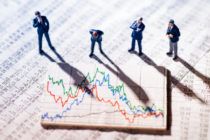The US equity market has been a star performer since the global financial crisis. Especially over the past two years, it has shown a rare combination of low volatility and high returns, compared to other equity markets. As Blackrock’s chief market strategist Richard Turnill noted this month, US equity volatility is now at its lowest point in two decades.
US equities have generated between two and three times the returns of European, Japanese and emerging market equities since 2009 (see chart below), both in euros and in local currency terms. And the performance gap has only grown bigger as time progressed.

Sadly, European investors have missed much of the upside of the past 18 months. Deterred by high valuations, they have pulled out money in 14 of the past 18 months as they choose for ‘cheaper’ European equities.
Safe haven appeal
But that seems to be changing, as the factors that have driven US equity markets to unprecedented heights are still there, and political uncertainty in Europe has dented appetite for stocks from the continent. According to data compiled by Blackrock, US equities are the most popular equity asset class with investors globally, and being overweight them has become more popular since the Brexit vote.

David Karni (pictured right), head of fund selection at BCC Risparmio & Previdenza, is one of these investors for whom the appeal of US equities has recently increased. “The week before Brexit, we reduced our overweight to European equities back to neutral, and added to our US equity holdings where we were previously underweight,” he says. As has been its habit over the past seven years, the asset class hasn’t disappointed Karni. Since the Brexit vote, the three funds he added money to have all returned between 5% and 7%.
Karni’s main motivation to increase his exposure to US equities at a moment when asset prices have doubled in less than five years, is that he considers it a safe bet. “I’m not convinced US equities will be a performance driver over the next 12 months. But that’s why we have chosen for stable funds.”
The three funds Karni bought into (the Fidelity America fund; the Vontobel US Equity fund and the Morgan Stanley US Advantage fund), adding to positions he already had, do indeed all have a quality growth bias.

Mike Bell, global market strategist at JP Morgan AM, agrees with Karni that US equities look comparably attractive at the moment, much of which is due to the relative strength of the US economy at the moment, and also to the make-up of the US equity market.







